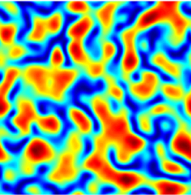Collective Phenomena
The front lines of physics may be defined by the scales that form the boundary of our knowledge, from the very large (the cosmos) to the very small (elementary particles). The study of collective phenomena forms part of a different frontier -- the complexity frontier -- where we have the temerity to seek answers to seemingly impossible questions. Answers that may explain how patterns of large-scale behaviour emerge from the complex interactions of the small constituent parts.
EXAMPLE: Are there simple principles that explain why the electrons in a metal cooperate to flow without resistance at low temperatures? What laws describe this superconducting flow?

Due to their inherent complexity, collective phenomena are studied by a two-pronged approach. One path follows the spirit of hydrodynamics, and posits the laws of cooperative motion from fundamental conservation laws and symmetry. What equations describe the dynamics of the magnetisation of a magnetic solid? Or the molecular alignments of a liquid crystal? The second develops simple microscopic models, with only a fraction of the true detail of the atomic scale, and tries to show by analytical or numerical means that the correct macroscopic behaviour emerges. An example of this duality, familiar to many students of physics, is the ferromagnetic phase transition. The appearance of spontaneous magnetization may be described by Landau theory -- a phenomenological free energy -- or by an Ising model, which is no more than a caricature of the interactions between magnetic moments in a true solid, but captures the essence of their cooperative behaviour.
The study of collective phenomena is thus distinct from materials science, chemistry, or atomic physics, but enjoys a symbiotic relationship with these fields, with new states of matter providing fresh arenas for collective behaviour. It is no coincidence that this behaviour is the source of the technological importance of such discoveries, whether in magnetic storage, superconducting electronics, or quantum information science.
Current research topics in the group include:
- out of equilibrium quantum systems (Cooper, Lamacraft, Nunnenkamp)
- thermodynamic, relaxation and response properties in frustrated magnetic systems (Castelnovo)
- cold atomic systems and artificial gauge fluxes (Conduit, Cooper, Nunnenkamp, Simons)
- strongly correlated electronic matierials (Castelnovo, Cooper)
- topological phases of matter and their excitations (Béri, Castelnovo, Cooper )